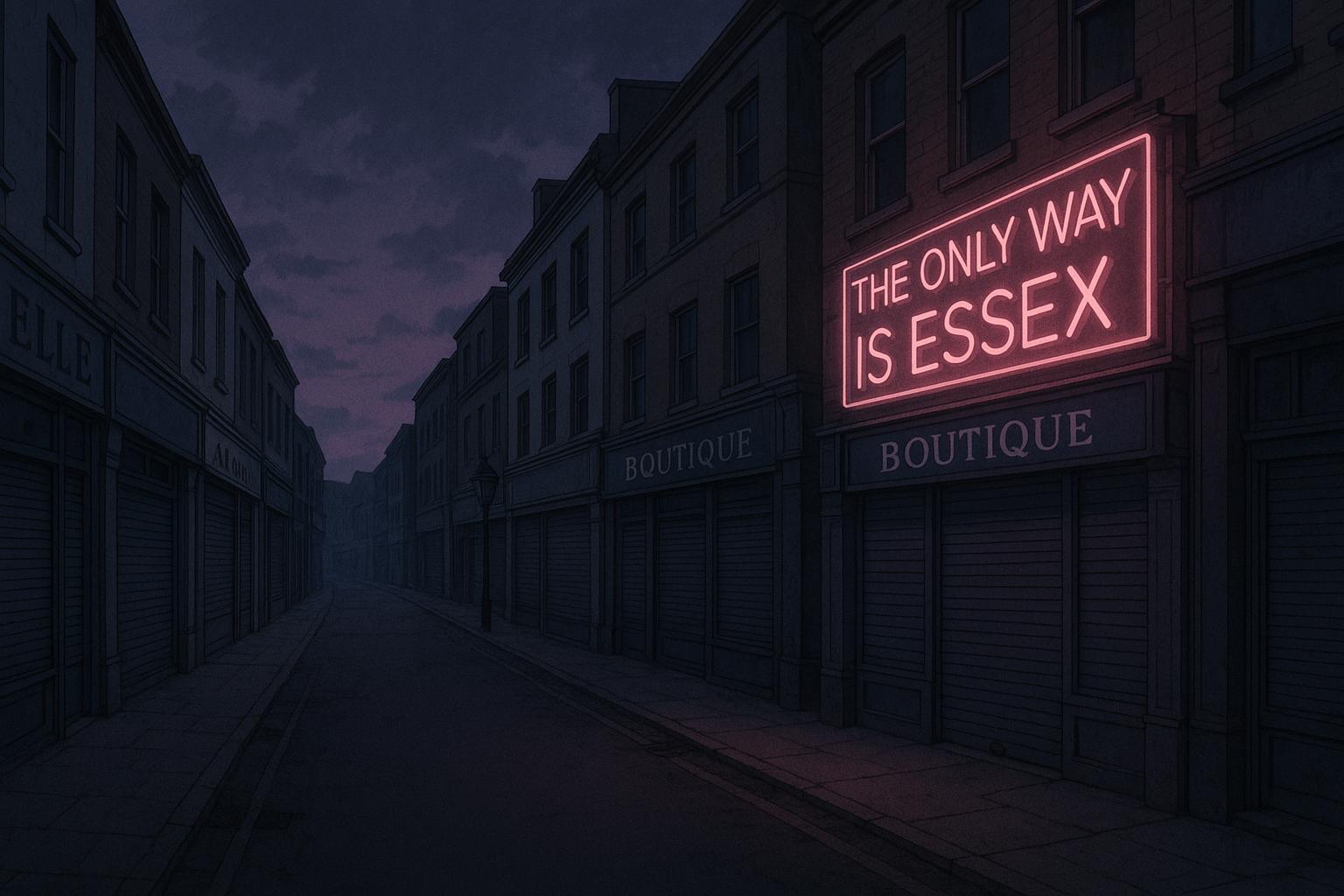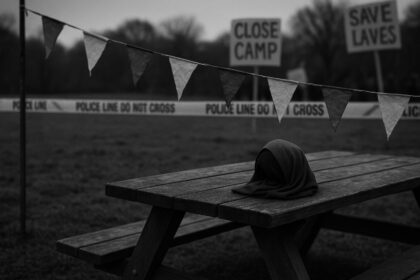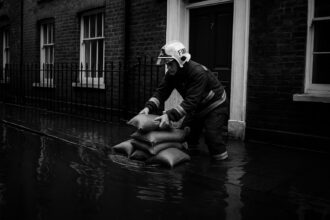As The Only Way Is Essex marks 15 years, Brentwood faces a stark transformation with its once-vibrant Towie-fuelled economy in steep decline, iconic venues closing, and the town grappling with the legacy of fading glamour and growing local concerns.
As “The Only Way Is Essex” (Towie) celebrates its 15th anniversary, the cultural phenomena that once transformed Brentwood into a bustling hotspot for reality TV fandom now echoes with a sense of loss. The show, which was a beacon of glamour and faux tan in the early 2010s, has seen a dramatic decline, reflected not only in its dwindling audience but also in the changing face of the town that embraced it.
Brentwood, once alive with fans flocking to boutiques and nightclubs, feels hauntingly deserted. The High Street, once teeming with tourists and cast-endorsed businesses, now resembles a ghost town. The fall from grace is stark; where Towie once dazzled with over 1.7 million views per episode, last year’s finale barely scraped together 50,000 live viewers. As the cameras continue to roll, the passion that fuelled this reality explosion seems to have dimmed, leaving the show’s 35th series to feel more like an echo of its former glory.
At the heart of this transformation is James ‘Arg’ Argent, one of Towie’s most famous figures, who recently sparked controversy by pleading guilty to a domestic violence charge. His legal troubles underline the unsettling narratives that have begun to overshadow the programme’s entertainment value. Once a hallmark of glam and excess, the lives of Towie stars are increasingly punctuated by serious issues, reflecting a broader malaise afflicting the reality TV realm.
In its heyday, the show was an industry, spawning businesses that boomed alongside its fame. Sam Faiers and her sister Billie, for instance, launched Minnies Boutique in 2011, which became emblematic of the Towie era. Their success inspired numerous others, with cast members opening hair salons, boutiques, and even nightclubs. Yet the golden age has well and truly faded. Meanwhile, those businesses that once thrived have succumbed to the inevitable tide of change. The once-vibrant boutiques, including Faiers’s store, have either closed or transitioned online as footfall evaporated. A shop that sold glamour and luxury is now occupied by a Japanese head spa, a sign of the town’s unfortunate shift in identity.
Local sentiment echoes this sense of nostalgia for the bustling high street of days gone by. Residents recall the chaotic energy of Towie premieres and the celebrity presence that revitalised local commerce. Now, the High Street is peppered with barbers and vape shops, indicative of a broader trend seen across British towns that struggle to maintain their charm in the face of changing consumer habits. Indeed, over 750 new barbers set up across the UK last year, some controversially linked to organised crime, compounding worries that Brentwood’s decline is part of a wider national concern regarding high street vitality.
Yet not all acknowledge the full impact of Towie’s downturn. A few local business owners still express hope that the show retains some appeal to tourists, although they rue the absence of vibrant foot traffic. Recent interactions with visitors show a split in opinions; some feel unsettled by the rowdy behaviour associated with Towie tours on weekends, while others reminisce about the economic boost the show once provided. This duality illustrates the tightrope local businesses walk—between the economic opportunities presented by Towie and the social discomfort felt by the long-term residents.
Adding complexity to the narrative is the collapse of the Sugar Hut, the iconic nightclub synonymous with Towie. Once a cherished venue for late-night escapades, its recent listing at £3.85 million echoes the town’s transformation. The Sugar Hut’s decline underscores a wider sense of loss felt by locals; the community surrounds itself with a lore of misfortunes that have plagued former venues, further deepening the mythology of decline that has captivated their imaginations.
In years past, the Sugar Hut and other Towie-linked sites were part of a vision where celebrities would drive the local economy. Instead, there’s an increasing sense of dread over looming closures and fading memories. The town’s past vibrancy continues to be overshadowed by rogue narratives, reminiscent of the ‘Towie curse’, which some locals believe haunts the establishments that succumb to misfortune.
As Brentwood grapples with its identity post-Towie, the pungent smell of weed wafts through the streets, a stark reminder of the changes enacted amidst a broader cultural shift. Long-time residents mourn not only the loss of shops but the death of a certain joie de vivre that once buzzed along Brentwood High Street. The remnants of Towie culture linger, promising occasional nostalgia, but increasingly seem like relics of an era that no longer resonates.
While the stars of Towie may have to seek new horizons away from Brentwood, the town itself remains at a crossroads—at the intersection of memory and reality. The future appears uncertain, with whispers of potential businesses that may revive the High Street, yet the echoes of Towie serve as a constant reminder of how rapidly fortunes can change. Brentwood’s soul feels lost, overshadowed by shadows of its own making, and as the neon lights of reality begin to dim, it poses a poignant question: what remains when the cameras stop rolling?
Reference Map
- Paragraphs 1, 2, 3, 4, 5, 6, 7, 8 – (1)
- Paragraphs 2, 3, 5 – (2)
- Paragraphs 5, 6, 7 – (3)
- Paragraphs 3, 7 – (4)
- Paragraph 6 – (5)
- Paragraph 6, 8 – (6)
- Paragraph 1 – (7)
Source: Noah Wire Services
- https://www.dailymail.co.uk/tvshowbiz/article-14720671/reality-tv-brentwood-high-street-essex-closed-barbers-vape-salons.html?ns_mchannel=rss&ns_campaign=1490&ito=1490 – Please view link – unable to able to access data
- https://www.bbc.co.uk/news/uk-england-essex-33760895 – An article discussing how ‘The Only Way Is Essex’ (TOWIE) tours, stag parties, and hen nights in Brentwood are reportedly deterring some local residents. Councillor Chris Hossack expressed concerns that the influx of visitors for TOWIE-related activities is making some locals uncomfortable, particularly during weekends. The article highlights the tension between the economic benefits brought by tourists and the discomfort felt by some residents due to the changes in the town’s atmosphere.
- https://www.chelmsfordweeklynews.co.uk/news/15262771.brentwood-nightclub-bosses-announce-closure-after-tv-show-blamed-for-business-decline/ – This piece reports on the closure of Eclipse nightclub in Brentwood, which cited the decline in business attributed to the popularity of TOWIE. The club’s managing director, Kevin Springham, mentioned that local residents were avoiding Brentwood on weekends due to the national TV exposure brought by the reality show. The article sheds light on the challenges faced by local businesses in adapting to the changes brought by the show’s fame.
- https://www.echo-news.co.uk/news/24693400.towies-famed-sugar-hut-building-brentwood-listed-3-85m/ – An article detailing the listing of the Sugar Hut nightclub building in Brentwood for £3.85 million. The venue, made famous by TOWIE, is described as a historic Grade II* listed building spanning over 13,000 sq ft. The article discusses the potential for the building to be transformed into a hotel, restaurant, or other hospitality venue, reflecting the changing landscape of businesses associated with the reality show.
- https://www.essexlive.news/whats-on/shopping/towie-still-bring-people-brentwood-1451775 – A report examining whether TOWIE continues to attract visitors to Brentwood or if the reality TV ‘bubble’ has burst. The article features insights from local business owners on the High Street, discussing the impact of the show on footfall and sales. Some shop owners note a decline in the TOWIE effect since many of the cast’s shops closed, while others acknowledge the show’s role in bringing visitors to the area.
- https://www.itv.com/news/london/2016-05-11/has-the-towie-bubble-burst-joey-essex-shutting-shop-in-brentwood – An ITV News report on Joey Essex’s decision to close his clothing store, Fusey, in Brentwood. The article highlights claims that Essex failed to integrate with the local community, leading to the store’s decline. It also mentions other TOWIE-related businesses that have closed, such as Harry’s World and Charlie Sims’ High Street delicatessen, indicating a broader trend of business closures linked to the show’s fading popularity.
- https://www.greatbritishlife.co.uk/magazines/essex/22618520.high-street-heroes-brentwood/ – An article highlighting the mix of history, heritage, and modern businesses on Brentwood’s High Street. It mentions outlets owned by TOWIE cast members, including a plus-size boutique, a sports nutrition shop, and a delicatessen. The piece discusses how these businesses have contributed to preserving a locally-run High Street, despite facing criticism, and how the show’s association has brought increased exposure and sales to these stores.
Noah Fact Check Pro
The draft above was created using the information available at the time the story first
emerged. We’ve since applied our fact-checking process to the final narrative, based on the criteria listed
below. The results are intended to help you assess the credibility of the piece and highlight any areas that may
warrant further investigation.
Freshness check
Score:
8
Notes:
The narrative is current, referencing recent events and trends in Brentwood. However, it lacks specific dates for some events, which might indicate it is not entirely up-to-date.
Quotes check
Score:
6
Notes:
The narrative does not contain direct quotes, making it difficult to assess the originality or authenticity of any statements.
Source reliability
Score:
6
Notes:
The Daily Mail is a well-known publication, but its reliability can vary depending on the subject matter and the writer’s perspective.
Plausability check
Score:
8
Notes:
The decline of TOWIE’s popularity and the impact on local businesses are plausible, given the show’s history and trends in reality TV and high street economics.
Overall assessment
Verdict (FAIL, OPEN, PASS): PASS
Confidence (LOW, MEDIUM, HIGH): MEDIUM
Summary:
While the narrative is generally plausible, it lacks specific dates and direct quotes, and the reliability of the source is variable. However, the overall theme of Brentwood’s transformation post-TOWIE aligns with broader trends in reality TV and high street economics.













